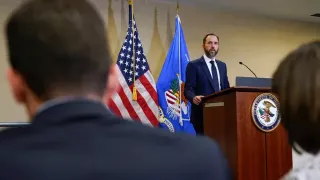Mar 21
Bowen Yang Reflects on Themes of 'Racism and Fascism' in 'Wicked' and Taking LSD
Kilian Melloy READ TIME: 2 MIN.
Bowen Yang served up some commentary, calling it "miraculous" that "Wicked" has been allowed on movie screens in the age of Trump and noting the parallels between the film and real life.
Yang addressed the crowd "at BFI Flare, the London LGBTQIA+ Film Festival, during a screen talk on Thursday [March 20] in the British capital," The Hollywood Reporter detailed.
"It's crazy that 'Wicked' is out in the world and doing so well," the "Saturday Night Live" star reckoned, "when it's a story about racism and fascism, all these things.... Like, the only reason that the wizard has powers is because he creates problems for other people."
Yang revealed that "Wicked" director Jon M. Chu cheered him on when it came to ad-libbing lines for the movie adaptation of the smash Broadway hit.
"I said, 'Okay, I'm now going to do just a fun one, they're not going to use this,'" Yang recounted, adding that his attitude was that he could not possibly come up with anything comparable to the script by Winnie Holzman and Dana Fox.
But, he said, he was in for a surprise: "Then Jon used all of my ad libs!"
Chu clearly knew what he was doing; Yang told the audience that the cast were "all in over our heads" and "kind of out to sea" on the film, but the director ably guided the movie to completion. (Part 2 of the adaptation is due later this year.)
Yang, who will be appearing next month in "The Wedding Banquet" – director Andrew Ahn's remake of Ang Lee's classic 1993 gay film – went on to talk about working with Ahn once again, following his role in Ahn's 2022 film "Fire Island."
Ahn "knows the trope" of the rom-com, Yang said. "He will dial it up to the max, and then completely cut off the thread. It's a rule of writing in comedy, too," the funnyman added. "You pull a thread loose, and that's the first thing. Then you yank it again and then you cut the thread. Then you think it's over, and you yank it one more time."
Yang took the opportunity to share a juicy bit about his personal process when it came to embracing what might be his best-known role, and the one that catapulted him to stardom: joining the cast of "Saturday Night Live."
It wasn't an easy prospect for him to comprehend, Yang said. In fact, he had to undertake a vision quest of sorts to see himself in that role.
"I was like, 'I don't think I can do this. What is me being on this show? What is that gonna look like? That's gonna feel crazy,'" Yang recalled thinking.
His doubts dissolved with help from a little LSD, which, Yang said, he took on a beach.
Together with the psychoactive substance, Yang said, he moved past his doubts by "watching sketches on my phone of [Bill Hader's recurring character] Stefon," THR relayed. "I hallucinated myself as Stefon. And I was like, 'Oh I see it now.' And I got to tell Bill that."






